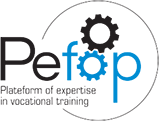Supporting Innovation in the Renewal of Vocational Training Policy
For vocational training systems in Africa to evolve, it is crucial to promote the development, valorization and capitalization of new approaches and ideas that bear strong potential to inspire and contribute to find solutions to vocational training challenges.
Support to innovation, as offered by the IIEP-UNESCO Dakar, has a double dimension:
- To financially support innovation likely to contribute to the development of vocational training policy. This support will aim to strengthen the perpetuation of innovative and promising practices, providing them with targeted and temporary support.
- To ensure that the innovation supported is capitalized in such a way as to appraise the conditions of its success and replicability, through strengthened knowledge management and outreach. The lessons learned should be documented, disseminated and debated. For each practice supported, a capitalization document will be edited.
By valuing diverse players that are willing to innovate and by documenting their experiences, the IIEP-UNESCO Dakar hopes to achieve a multiplier effect that will contribute to the constructive evolution of vocational training practices.
In view of selecting those innovative practices that will receive support, five themes have been identified and prioritized. These are the areas for which it is hoped that innovation will constitute a source of examples and inspiration to propel vocational training reform efforts in the region. To receive support, an innovating practice should therefore demonstrate its contribution to at least one of the following priority themes:
- 1) Impact on the Professional Integration of Beneficiaries
A practice proposed to receive innovation support should demonstrate its capacity to contribute to an increased level of professional integration of targeted beneficiaries. An appraisal of the level of integration should incorporate two dimensions: quantitative, in terms of the level of integration of trained individuals (via a percentage where possible); and qualitative, in terms of the sustainability of their integration.
- 2) Involvement of Professionals
The practice submitted to receive innovation support should demonstrate that it is designed, managed and implemented according to a partnership approach, with relevant professionals (formal or informal). Particular attention will be paid to the approach used to determine training content (curricula and so on), training modes (apprenticeships, sandwich courses and so on) and the skills’ certification method retained, involving professionals.
- 3) Level of Financing Sustainability
A practice applying for innovation support should demonstrate that its financing has been designed to be sustainable. This should encompass both management and operational expenses, and infrastructure and equipment costs. Practices should propose to set-up co-financing and auto-financing mechanisms, in the short and long-terms, that reduce the dependency on public subsidies or occasional external resources to a strict minimum.
- 4) Links to Priority Occupations, According to Context
Practices applying for innovation support should target occupations geared towards sectors that represent an economic priority in a given context. These may include both sectors that are heavily recruiting as well as those expected to undergo significant growth in the near future as a result of economic and social development, and that will require trained labor.
- 5) Improved Access for Marginalized Groups
A practice submitted to benefit from innovation support should contribute to improve marginalized groups’ access to vocational training. Marginalized groups may vary according to local contexts, but typically include individuals living in rural areas, women and girls, disabled people, individuals of low socioeconomic status and those facing under- or unemployment. The aim here will be to promote and facilitate access to training via decentralization, and the expansion or development of training streams that target these groups.
Two dimensions should be considered to determine whether a practice is innovative: the nature of the practice and its state of advancement.
- The Nature of the Practice:
> Innovative practices considered may be:
- a vocational training mechanism in its own right, or a practice that impacts one;
- an action undertaken in a country to effectively implement components of the national vocational training policy and that constitute a solution to a situation of deadlock; or> A practice that proposes:
- creative and new solutions to situations of deadlock;
- an idea that is not necessarily new or unprecedented, but that could mean changing one of the main dimensions of an existing practice, the gradual modification of an approach or the local adaptation of an idea that proved to be effective in a different country or context.
- The State of Advancement of the Practice:
> A practice underway that is already fairly mature, but with some incomplete dimensions/components;
> A practice whose promoters are facing some difficulties (hindrances) in the finalization/completion of the forementioned dimensions/components; or
> A practice that has already demonstrated dynamic or even small-scale positive effects and that needs support to evolve and gain value.
Examples of practices with proven potential but requiring improvement or institutionalization that could apply to benefit from financial support are:
- Certain businesses are committed to offering apprenticeships to youth excluded from the education system, providing them with an opportunity to acquire a qualification. The operation has been underway for several years and is positive, as the qualification as well as the organization of the conditions for its obtention have gained the recognition and validation of businesses and the professional sector to which they belong. However, an issue is raised by where exactly this qualification fits within existing national qualification frameworks. The IIEP-UNESCO Dakar could support the formal national endorsement and anchorage of the said qualification.
- A vocational training institute developed a network of partner businesses that regularly offers internships to its learners and participates in its training activities. Before each sandwich course, businesses invite trainers to visit their workshops so that they may understand their situation and prepare learners’ internships in the best possible way. The IIEP-UNESCO Dakar could support a project for the technical preparation of trainers and include the conditions for its set-up in regulations pertaining to the management of this staff category.
The IIEP-UNESCO Dakar does therefore not provide financial support to practices that are still at the stage of theoretical design. Neither does it support the replication of confirmed practices, formally recognized and valued, having led to compelling results, that it would be beneficial to spread. Such cases would rather be aligned with the good practice category.
The proposed support is therefore not a bonus or financial compensation that beneficiaries are free to use as they see fit.
The IIEP-UNESCO Dakar supports innovative practices that have a proven need of backing to complete their development, achieve sustainability and attain their goals. Subsidies will be used to finance aspects required to finalize the main dimensions of the practice, for which the bearers face difficulties.
The total amount of the financial support offered can reach the amount of thirty thousand US dollars (USD 30,000). This is not disbursed as a bonus. It will be aligned with an action plan to be carried out according to a service contract between the IIEP-UNESCO Dakar and the chosen practice’s promoter.
Support can adopt different shapes according to the needs of the chosen practice, such as:
- Assistance in the finalization of pedagogical and regulatory aspects, and their anchorage within national mechanisms;
- Help in the finalization of communication materials about the practice;
- Technical assistance to bring about an evolution in work methodologies, to develop growth strategies, to improve management systems and so on; or
- Help in networking with key players.
The concrete shape support to a chosen practice adopts will be determined in close collaboration between the IIEP-UNESCO Dakar and the promoter of the chosen innovative practice. Proponents of the selected practices should be prepared to get fully involved in the process supported, and to devote whatever time and internal resources may be required for its success.
The IIEP-UNESCO Dakar does not finance the running costs of innovative practices, such as staff salaries, general management expenses, equipment and furniture, rented workspace and so on. The IIEP-UNESCO Dakar does not support practices that already benefit from another source of financial or technical support for the aspect submitted for funding. In cases where alternative financing or support exists, proponents should declare it/them, demonstrate that the aspect under consideration is not covered by it/them, and explain why it is truly in need of support.
Selected practices will be subject to a contract between the IIEP-UNESCO Dakar and their proponents. This contract will stipulate that the disbursement of the agreed subsidy will be subject to a roadmap being followed and interim reports being submitted. Each practice will be monitored by a vocational training expert.
Who can apply?
Private or public entities based in one of eleven countries (Benin, Burkina Faso, Cameroon, Chad, Côte d’Ivoire, Guinea, Mali, Mauritania, Niger, Senegal and Togo) that are involved in the implementation of vocational training policies will be eligible to respond to the invitation for applications: central or decentralized government services, regional and local authorities, public or private training, teaching or research institutes, trade and trade union organizations, NGOs, consulting firms and so on.
The selection will be carried out by a selection panel (an ad hoc committee). To ensure the panel’s neutrality, no member may bear any relationship to the shortlisted practices.
The selection process is carried out in three steps:
- 1) A first selection will be based on applications, according to practices meeting eligibility requirements.
- 2) A second stage of the selection process will be based on weighted selection criteria. The practices with the highest scores will be shortlisted. There is no minimum score required for selection.
- 3) The third and final stage of the selection process entails checking the information provided by proponents and the final choice of those practices to finance.
The IIEP-UNESCO Dakar will issue an invitation to tender. The invitation will be published on the IIEP-UNESCO Dakar website (https://dakar.iiep.unesco.org/en) and on the PEFOP web portal that targets vocational training players (www.pefop.iiep.unesco.org). It will be promoted through networks and by other international institutions that are active in the area of vocational training in Africa. Practices must be proposed through the application form provided.
Existing beneficiaries may only propose new practices when they have fully implemented the terms of their ongoing support contract.

